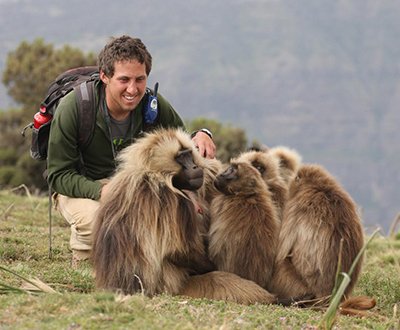New Faculty Spotlight: Dr. Noah Snyder-Mackler
 |
Recently we had a chance to sit down and interview our newest faculty member, Noah Snyder-Mackler, who is an Assistant Professor in the area of animal behavior. He joined the psychology department in the autumn of 2017.
How did you become interested in science and more specifically in animal behavior?
My whole life I’ve been fascinated by animal behavior — a fascination that, fortunately for me, has progressed from an avocation to a vocation (or perhaps some combination of both). I was exposed to science early in life being raised by two scientists. My mother is a sports rehabilitation scientist and my father was a neuroscientist. In addition, my grandfather is an avid amateur naturalist also had an early influence on me in terms of my interest in animal behavior. I was fortunate as a PhD student to be trained as a naturalist and mentored as an integrative animal behaviorist by two premier animal behavior researchers (Dorothy Cheney and Robert Seyfarth) at the University of Pennsylvania where I combined behavioral observations with genetic analyses to study the evolution of sociality in cowbirds and gelada monkeys. After that, I went to Duke University for a postdoc where I worked with evolutionary biologist Jenny Tung and honed my genomics skills studying how our social environment directly affects our immune system.
What draws you to your work? Why are you passionate about it?
We still don’t know how the social environment “gets under the skin” to alter physiology and impact health, survival, and reproduction in social animals. When I’m wearing my animal behaviorist hat, I’m study the interaction between the social environment and individual behaviors to see how these behaviors have ultimately been shaped by natural selection. When I’m wearing my biopsychologist hat, I am using my study subjects (monkeys) as a model for humans — after all, we’re all primates! Most of the time I’m wearing both hats — drawing on my insights from behavioral ecology to gain a better understanding of human behavior and health.
Your work involves field research which can be exciting and challenging. Do you have a favorite field site where you conduct your primate research?
I conduct research at two field sites, which are very different from one another. The most comfortable of the two is Cayo Santiago, which is a small island off of the southeastern coast of Puerto Rico and home to a colony of over 1000 free-ranging rhesus macaques. This field station is maintained by the Caribbean Primate Research Center and the University of Puerto Rico. We can conduct our research on Cayo Santiago and then motor our way back to the main island of Puerto Rico each night. Cayo Santiago was unfortunately heavily damaged by Hurricane Maria, but we're gradually rebuilding infrastructure there. My other field site, where I study gelada monkeys, is in the highlands of Ethiopia – a much more remote and challenging site. Despite the limited communication and logistical nightmare of getting supplies to and from the campsite, this field site is my favorite. The amazing landscape and unique animals make it one of the most beautiful places in the world.
Why is your lab’s research important? Why should the community care?
The one sentence cocktail party description of my work is “I study why chronic psychosocial stress is bad for your health and how having good friends can help protect you from those negative consequences”. That’s typically well-received, but it is often followed by the inevitable question: “So why aren’t you studying humans?” The short answer is that the social animals that I (and others) study make for a simpler model of human social behavior because, while we share many core neural and genetic pathways with nonhuman primates, they don’t have some of the added complications of human culture (e.g., monkeys don’t smoke, drink, or do drugs). The ultimate goal is of my lab’s work to identify underlying mechanisms so we can help people live longer, healthier lives.